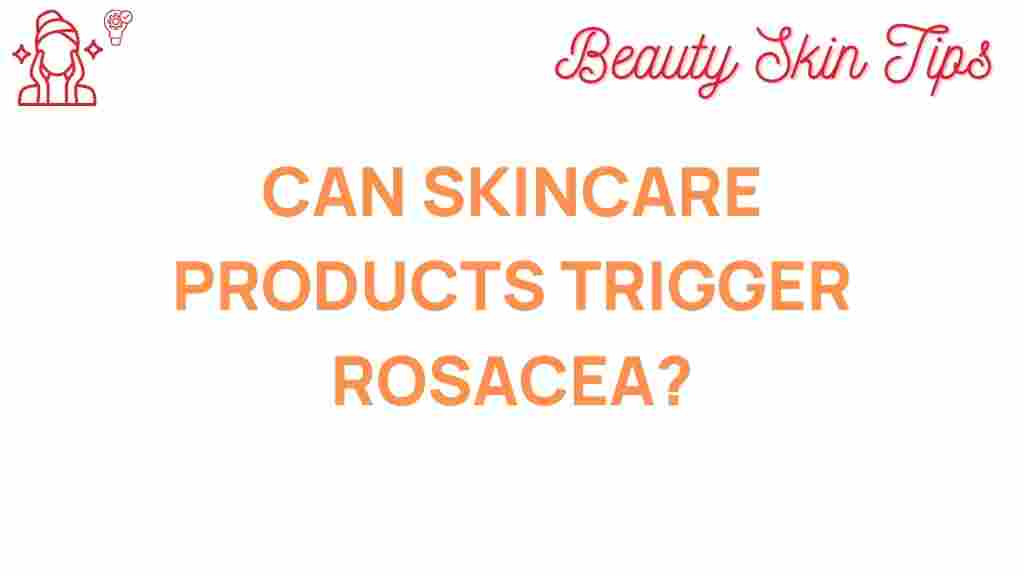Unraveling the Mystery: Can Skincare Products Trigger Rosacea?
Rosacea is a common skin condition that affects millions of people worldwide. It often manifests as facial redness, visible blood vessels, and sometimes acne-like breakouts. While the exact cause of rosacea remains elusive, many individuals wonder if their skincare products could be contributing to this inflammatory condition. In this article, we will explore the relationship between skincare products and rosacea, examining which ingredients may trigger flare-ups and how to choose products that promote skin health.
Understanding Rosacea
Before diving into the specifics of skincare products, it’s essential to understand what rosacea is and how it affects individuals:
- Symptoms: Common symptoms include persistent redness, visible blood vessels, and sometimes pustules or papules.
- Triggers: Factors such as sun exposure, stress, hot beverages, and certain foods can exacerbate the condition.
- Types: There are several subtypes of rosacea, including erythematotelangiectatic, papulopustular, phymatous, and ocular rosacea, each presenting unique challenges.
Can Skincare Products Trigger Rosacea?
The question of whether skincare products can trigger rosacea is complex. While some ingredients can irritate sensitive skin, leading to rosacea flare-ups, others can help manage the condition. Here are some crucial points to consider:
- Ingredients to Avoid: Certain ingredients are known to irritate the skin and may trigger rosacea. These include:
- Alcohol: Found in many toners and aftershaves, alcohol can be drying and irritating.
- Fragrance: Synthetic fragrances can provoke sensitive skin reactions.
- Exfoliants: Harsh physical exfoliants and some chemical exfoliants can lead to irritation.
- Retinoids: While beneficial for acne, they may aggravate rosacea in some individuals.
- Ingredients to Embrace: On the flip side, some ingredients can be soothing and beneficial for rosacea-prone skin. These include:
- Niacinamide: Known for its anti-inflammatory properties, niacinamide can help reduce redness.
- Aloe Vera: A natural soothing agent that calms irritated skin and provides hydration.
- Green Tea Extract: Rich in antioxidants, it can help reduce inflammation.
- Hyaluronic Acid: A hydrating ingredient that helps maintain moisture balance without irritating the skin.
Step-by-Step Guide to Choosing the Right Skincare Products
Selecting the right skincare products requires a strategic approach, especially for those with rosacea. Follow these steps to find suitable options:
Step 1: Identify Your Skin Type
Understanding your skin type is the first step in choosing appropriate skincare products. Take note of how your skin reacts to different products, and consider consulting a dermatologist for personalized advice.
Step 2: Read Ingredient Labels
Always read the ingredient labels of skincare products. Look for the following:
- Short ingredient lists with minimal additives.
- Products labeled as ‘fragrance-free’ and ‘alcohol-free.’
- Active ingredients known for their soothing properties, such as niacinamide and aloe vera.
Step 3: Patch Test New Products
Before incorporating a new product into your routine, perform a patch test:
- Apply a small amount of the product on a discreet area of skin.
- Wait 24-48 hours to see if any irritation occurs.
- If no reaction is observed, you may proceed to use the product.
Step 4: Start Slow
When introducing new skincare products, start slowly. Use one new product at a time, giving your skin time to adjust.
Troubleshooting Tips for Rosacea-Prone Skin
Even with the right skincare routine, flare-ups can occasionally occur. Here are some troubleshooting tips to manage them:
- Keep a Journal: Track your skincare products and any flare-ups. This can help identify potential triggers.
- Consult a Dermatologist: If you experience persistent symptoms, seeking professional advice can help. They may recommend prescription treatments.
- Limit Sun Exposure: Sun exposure can exacerbate rosacea. Use a broad-spectrum sunscreen with SPF 30 or higher.
- Use Gentle Cleansers: Opt for a mild, hydrating cleanser that won’t strip the skin of its natural moisture.
Conclusion
In conclusion, while certain skincare products can indeed trigger rosacea flare-ups, choosing the right products can help manage and soothe the condition. By understanding your skin, reading ingredient labels, and approaching new products cautiously, you can create a skincare routine that supports your skin’s health. Always consult a dermatologist if you’re unsure about specific products or if your rosacea symptoms worsen.
For more information on managing rosacea and finding suitable skincare products, check out this helpful resource.
Remember, skincare is not a one-size-fits-all approach, and what works for one person may not work for another. Stay informed, listen to your skin, and seek professional guidance when necessary.
This article is in the category Skincare and created by BeautySkinTips Team
